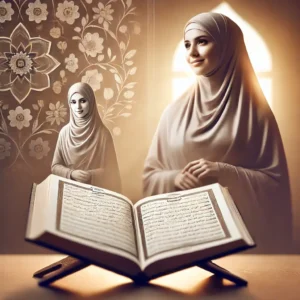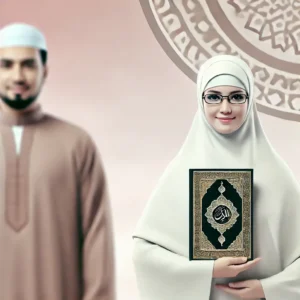The Quran provides a profound and balanced perspective on women's rights, addressing various aspects of life and offering guidance that has remained relevant for centuries. This article explores key Quran verses about women's rights and teachings, shedding light on issues like clothing, gender equality, the role of women in society, and more.
Quran Verse About Women’s Clothing
The Quran provides detailed guidance on women’s clothing, emphasizing the principles of modesty, dignity, and self-respect. One of the most referenced verses regarding women's dress is found in Surah An-Nur (24:31), which instructs women to "draw their veils over their bosoms and not display their beauty except to their husbands, their fathers, their husbands' fathers, their sons, their husbands' sons, their brothers or their brothers' sons, or their sister's sons, or their women, or their slaves, or male attendants having no physical desire, or children who are not aware of the private aspects of women."
- This verse is significant in that it underscores the importance of modesty as a means of preserving dignity and privacy. The command to "draw their veils over their bosoms" is not merely a physical directive but a spiritual one as well, aimed at encouraging women to carry themselves with grace and respect in public and private spheres. The concept of modesty in the Quran extends beyond clothing to encompass behavior, speech, and overall demeanor.
- Moreover, the guidance on clothing is intended to protect women from being objectified, ensuring that they are valued for their intellect, personality, and inner qualities rather than their physical appearance. The emphasis on modesty also serves to create a respectful and safe environment where women can interact with society without fear of exploitation or harm.
- The interpretation and application of these guidelines can vary across cultures and communities, but the underlying principle remains consistent: modesty is a form of empowerment, allowing women to define their own identity in a way that honors their faith and personal values. This holistic approach to modesty in the Quran reflects a deep respect for women’s rights and their role in society, balancing physical appearance with spiritual and moral integrity.
In this context, Quran verses about women's rights such as those in Surah An-Nur provide a framework for understanding how Islamic teachings aim to protect and uplift women, ensuring their respect and dignity in all aspects of life.
Read About: Can You wear a Hijab without being Muslim
What Does the Quran Say About Women's Bodies?
The Quran approaches the topic of women's bodies with great respect and dignity. It acknowledges the inherent physical differences between men and women and provides clear guidelines to protect and honor these distinctions. These guidelines are rooted in the principles of modesty, privacy, and respect, aiming to ensure that women are valued for their intellect, character, and inner qualities rather than merely their physical appearance.
- The emphasis on modesty in the Quran extends beyond just clothing; it encompasses behavior, speech, and overall conduct. Women are encouraged to dress modestly and conduct themselves in a way that preserves their dignity and privacy. This modesty is not just a personal virtue but also a protective measure that safeguards women from being objectified or reduced to their physical attributes.
- By promoting modesty, the Quran helps to create an environment where women are respected and appreciated for their contributions to society, rather than being judged or valued based on their physical appearance. This approach aligns with the Quran's broader teachings on the equal worth and dignity of all human beings, regardless of gender.
Take a look and read more about: When Can a Woman Take Off Her Hijab?
What Does the Quran Say About Gender Equality?

Gender equality is a core principle in the Quran. It asserts that men and women are equal in their relationship with Allah and in their responsibilities toward society. The Quran explicitly states that both genders are entitled to equal rights in matters of inheritance, education, and personal development (Surah An-Nisa 4:32). This equality, however, does not mean identical roles, but rather complementary responsibilities that cater to the strengths of each gender.
Quran Verses About Women's Rights

The Quran provides a comprehensive and profound perspective on women's rights, emphasizing the dignity, respect, and equality that women are entitled to in all aspects of life. Unlike many other texts from its time, the Quran introduced revolutionary concepts regarding the treatment and rights of women, ensuring their status as equal members of society.
Dignity and Respect for Women in the Quran
The Quran repeatedly emphasizes the dignity and respect that should be afforded to women. Women are recognized not only for their roles within the family but also as individuals with their rights and responsibilities. The Quran acknowledges the equal spiritual and moral status of men and women, affirming that both genders are entitled to their rights in the eyes of Allah.
Creation from a Single Soul
One of the most powerful Quranic verses that highlight women's rights is found in Surah An-Nisa (4:1), which states: "O mankind, fear your Lord, who created you from one soul and created from it its mate and dispersed from both of them many men and women." This verse underscores the concept that men and women were created from a single soul, emphasizing their inherent equality and shared responsibility in society. It reinforces the idea that both genders have been endowed with the same potential and are equally accountable to Allah.
Rights in Marriage, Inheritance, and Personal Freedom
The Quran provides detailed guidelines on various rights that women possess, especially in marriage, inheritance, and personal freedom. Surah An-Nisa (4:7) explicitly states that women have the right to inherit property, a right that was revolutionary at the time of its revelation. The Quran also outlines the responsibilities of men and women within marriage, promoting mutual respect, kindness, and fairness. It ensures that women have the right to enter into and dissolve marriages, manage their wealth, and seek education and personal growth.
Shared Responsibility and Equal Rewards
The Quran also highlights that men and women share equal responsibility in their spiritual journey. Both are equally rewarded for their good deeds and equally accountable for their actions. Surah Al-Ahzab (33:35) is a clear testament to this, stating: "Indeed, the Muslim men and Muslim women, the believing men and believing women, the obedient men and obedient women, the truthful men and truthful women, the patient men and patient women, the humble men and humble women, the charitable men and charitable women, the fasting men and fasting women, the men who guard their private parts and the women who do so, and the men who remember Allah often and the women who do so - for them Allah has prepared forgiveness and a great reward."
Empowering Women Through Knowledge
The Quran strongly advocates for the education and empowerment of women. It encourages both men and women to seek knowledge and develop their intellectual and spiritual capacities. By doing so, women are empowered to contribute to their families, communities, and societies in meaningful ways. The emphasis on education and knowledge ensures that women are not only informed about their rights but also equipped to exercise them fully.
The Quranic teachings about women's rights are comprehensive and progressive, ensuring that women are treated with dignity, respect, and fairness in all areas of life. By examining Quran verses about women's rights, we can see that the Quran lays a strong foundation for gender equality, shared responsibility, and the empowerment of women. These teachings continue to serve as a guiding light for millions of Muslims around the world, promoting a society where both men and women can thrive equally.
What Does the Quran Say About Women's Empowerment?
The Quran is a powerful advocate for women's empowerment. It encourages women to seek knowledge, contribute to their communities, and assert their rights. The story of Queen Bilqis (Surah An-Naml 27:44) serves as a profound example of a woman in a position of power, demonstrating leadership and wisdom. The Quran's teachings empower women to take active roles in both the private and public spheres.
Prophet Muhammad’s (peace be upon him) Teachings on Women

Prophet Muhammad (PBUH) stands as a remarkable figure in history for his progressive and compassionate views on women’s rights. His teachings and practices reinforced the Quranic directives on women’s dignity, respect, and equality, and his life serves as a guiding example for Muslims on how to treat women with the utmost respect and fairness.
Emphasizing Kindness and Respect
One of the most notable aspects of Prophet Muhammad’s (PBUH) interactions with women was his consistent emphasis on kindness and respect. He often highlighted the importance of treating women well, stating in his Farewell Sermon: "Fear Allah in respect of women, and be kind towards them." This directive was revolutionary at a time when women were often seen as property or were subject to harsh treatment. The Prophet’s teachings were aimed at correcting these societal norms, ensuring that women were treated with the same kindness and respect afforded to men.
Advocating for Women's Education
Prophet Muhammad (PBUH) was a strong advocate for the education of women, recognizing that knowledge was a key to empowerment. He famously stated, "Seeking knowledge is an obligation upon every Muslim," which applied to both men and women. The Prophet encouraged women to learn and acquire knowledge, and he provided them with opportunities to do so. He often taught women directly, and many women became prominent scholars and teachers in early Islamic society. This emphasis on education helped to elevate the status of women, allowing them to contribute significantly to the intellectual and spiritual development of the community.
Recognizing Women’s Contributions
Throughout his life, Prophet Muhammad (PBUH) acknowledged and appreciated the valuable contributions of women to society. He respected the opinions and advice of women, including his wives, who played significant roles in the early Islamic community. His wife, Aisha (RA), is well-known for her profound knowledge of Islam, and she became one of the most important sources of Hadith (sayings of the Prophet) and Islamic jurisprudence. The Prophet’s recognition of women’s abilities and contributions set a precedent for future generations, illustrating that women are integral to the development and success of society.
Promoting Equality and Justice
Prophet Muhammad (PBUH) was a staunch advocate for justice and equality, particularly concerning the treatment of women. He worked tirelessly to ensure that women were given their rightful place in society, with access to the same rights and opportunities as men. He abolished many of the pre-Islamic practices that oppressed women, such as female infanticide, and instituted legal rights for women in areas like marriage, inheritance, and personal freedom. The Prophet’s teachings emphasized that men and women are equal before Allah, and that both are accountable for their actions and deserving of respect and justice.
Leading by Example
The Prophet’s own life was a testament to his teachings on women’s rights. He treated his wives with love, respect, and kindness, setting an example for all Muslims to follow. He never spoke harshly to them, supported them in their endeavors, and ensured that their needs were met. His relationship with his daughter, Fatimah (RA), also reflects his deep respect and affection for women. He would often stand to greet her, kiss her forehead, and offer her his seat, demonstrating the high regard he had for her.
Does the Quran Support Women's Rights?
Absolutely. The Quran explicitly supports women's rights in various aspects of life. It grants women the right to own property, seek education, work, and participate in social and political life. Surah An-Nisa (4:7) affirms that women have the right to inherit, just as men do, which was a revolutionary concept at the time of its revelation.
What is a Woman's Role According to the Quran?
The Quran acknowledges the diverse roles of women in society. Women are seen as individuals with their own rights and responsibilities, independent of their roles as wives or mothers. The Quran encourages women to be active participants in their communities, to seek knowledge, and to fulfill their religious obligations. While it recognizes the importance of family and motherhood, it does not confine women to these roles alone.
What Does the Quran Say About Women's Money?
The Quran explicitly states that women have full control over their financial assets. Women are entitled to own property, earn money, and manage their finances independently. Surah An-Nisa (4:32) supports the idea that women can work and earn for themselves, and they are not obliged to share their wealth with anyone unless they choose to do so.
Join Us Now
At Al-Walid Academy, we offer a wide range of carefully designed courses to help you achieve your educational goals in Quranic studies and Arabic language learning. Whether you’re looking to master Quran Memorization, improve your Quran Reading Course with proper Tajweed, or gain a deeper understanding of Islamic Studies, our experienced instructors are here to guide you. Take a look at our Islamic Studies Course
For those interested in learning the Arabic language, we provide comprehensive Arabic Language Course, catering to all levels—from beginners to advanced learners.
Additionally, our Arabic Foundation Course is perfect for those looking to build a strong base in the language, focusing on speaking, writing, and comprehension.
Join us today at Al-Walid Academy and take the first step towards mastering the Quran and the Arabic language.
Conclusion
The Quran provides a comprehensive framework for understanding and upholding women's rights. Through its teachings, women are empowered, respected, and granted numerous rights that ensure their dignity and equality in all aspects of life. By studying Quran verses about women's rights, we can appreciate the balance and fairness that Islam offers, promoting a society where both men and women thrive equally.
FAQs
1 -What are the key Quran verses about women's rights?
- Key verses include Surah An-Nisa (4:1, 4:7, 4:32), Surah An-Nur (24:31), and others that emphasize equality, dignity, and respect for women.
2-Does the Quran allow women to own property and earn money?
- Yes, the Quran explicitly grants women the right to own property, earn money, and manage their finances independently.
3-How does the Quran address gender equality?
- The Quran acknowledges the equal spiritual and moral status of men and women, emphasizing that both are entitled to their rights and responsibilities.
4-What guidance does the Quran provide on women's clothing?
- The Quran advises women to dress modestly, drawing their veils over their chests, as a means of protecting their dignity and privacy.
5-What does the Quran say about women's empowerment?
- The Quran encourages women to seek knowledge, participate in society, and assert their rights, empowering them to take active roles in both public and private life.
